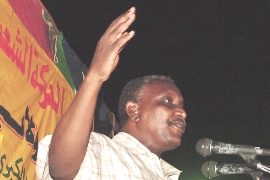Sudan’s partners fail to end differences on parliament timetable
October 29, 2009 (KHARTOUM) –The two signatories of the Comprehensive Peace Agreement (CPA) and partners in the national unity government once again failed yesterday to end their difference over the timetable of parliamentary agenda of the last session of the National Assembly.

On October 19, the SPLM bloc walked out of the federal house demanding parliamentary schedule for the remaining laws of referendum and national security. A week later the junior partner in the unity government said it will not return until the dominant National Congress Party (NCP) comes up with a timetable for reforms ahead of elections next year.
Yesterday the two parliamentary blocs met together to discuss possible way out of this crisis. Two delegations from NCP bloc led by Ibrahim Gandoor and from SPLM bloc led by Yasir Arman failed to come out with an agreement on the disputed issues.
However the two parties agreed to form a four member committee including the opposition National Democratic Alliance and southern Sudanese parties to explore a possible compromise in order to bridge the gaps between the NCP and SPLM.
Commenting on their failure to end the current row, the head of SPLM bloc at the National Assembly, Yasir Arman told reporters that his group would not take part in the discussion on the national budget for 2010. He also accused the NCP of dropping the membership of some SPLM MPs while it continues to allow the former foreign minister who is no longer a member of the SPLM to sit in the parliament.
“SPLM believes that the National Security Law cannot be passed by a single party,” Arman said, adding “If the Speaker wanted to pass this law with the vote of one party, let him do so and we will take what we deem appropriate”
The country will hold its first free and democratic election in April next year, but the national security law contrary to the Interim Constitution and the peace deal confers the power to arrest to the security apparatus. The SPLM says the draft law before the parliament is not the one that they had agreed upon with the NCP.
The NCP considers the boycott of the parliament by its peace partner as excessive pressure and blackmailing. In statements made yesterday, the Presidential adviser and NCP leading member Mustafa Osman Ismail said they consider Arman’s threats as “part of the tactic played by the SPLM to press the National Congress Party to make concessions after concessions.”
Ibrahim Gadoor said after his meeting with Arman that his party can pass the security law with the mechanic majority but added they prefer to have a consensus on this sensitive bill.
He also said that the delay in the vote of the new security law means that 1999 repressive law will continue to be in effect. Adding “We do not have a big problem with it if some want its survival.”
Gandoor further said that they cannot determine a timetable for the discussion of the referendum law because it is still under discussion on the level of the joint political committee. He regretted the SPLM rejection to a deal sealed between Vice President Ali Osman Taha and GOSS Vie-president Riek Machar recently.
The NCP also rejected the SPLM demand for a law on the popular consultation for the Blue Nile and Southern Kordofan states saying such consultations would be conducted on the level of the state parliament.
(ST)
